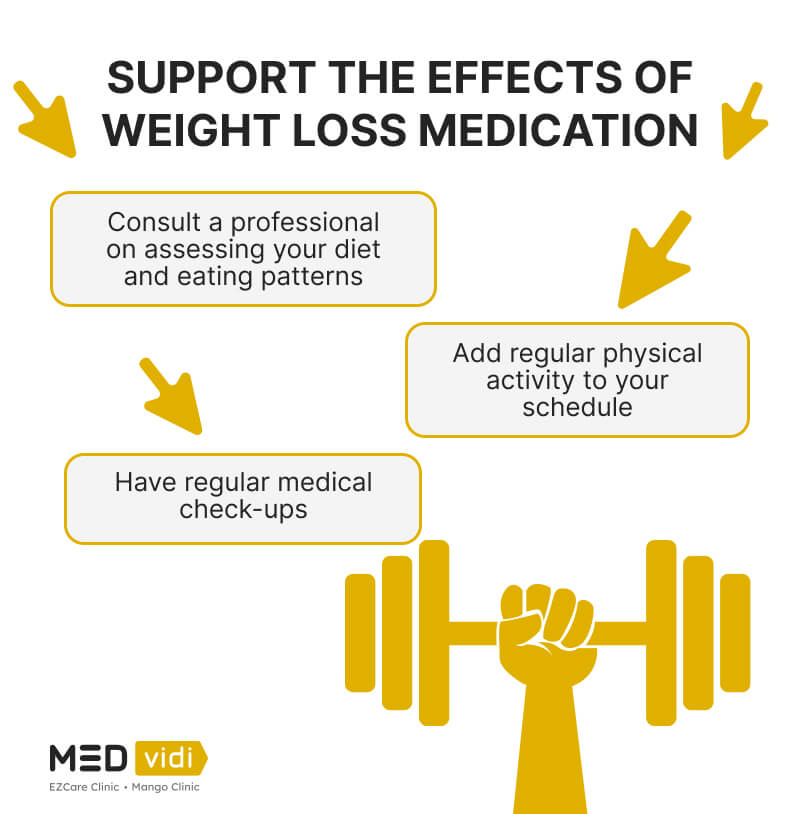In the quest to discover effective weight loss solutions, several medications have entered the spotlight over the years. While many of these medications are primarily developed to treat specific conditions, some have been found to have the added aid in weight loss.
Ozempic (semaglutide), originally developed to treat type 2 diabetes, has been one such off-label weight loss drug that has piqued the interest of those seeking to shed some pounds. But how effective is Ozempic for weight loss? Let’s dive in and find out.
Ready to explore new weight loss options?


What Is Ozempic?
Ozempic’s role in diabetes medication management is not just about sugar regulation. Its multifaceted benefits underscore the value of this diabetic shot in the comprehensive care arsenal for diabetes. As always, any decision to use Ozempic should be based on a detailed discussion with a healthcare professional, keeping in mind the individual’s needs.
How Does It Work?
By mimicking the natural GLP-1 hormone, Ozempic offers a dual approach to managing type 2 diabetes and aiding in weight loss:
- Blood sugar control. Ozempic stimulates insulin release when blood sugar is high and suppresses glucagon release when it is low, thereby maintaining balanced sugar levels.
- Appetite and digestion. It slows gastric emptying, promoting feelings of fullness. It also acts on the brain to reduce hunger, leading to decreased food intake.
These combined effects not only regulate blood sugar but also contribute to potential weight loss by reducing calorie consumption. The dual benefits of glycemic control and weight reduction make Ozempic indicated for weight loss an intriguing off-label option for many.
Does It Work for Weight Loss Purposes?
Ozempic has been initially used for type 2 diabetes but it can also serve as an injection for weight loss.
Cautionary note. While Ozempic causes weight loss, it is not specifically approved solely for this purpose. FDA approved another semaglutide-based medication Wegovy for weight management. Note that any weight loss benefits are more pronounced when combined with a healthy diet and regular physical activity.
Dosage
Doctors typically start patients on a lower dosage of an Ozempic pen and gradually increase it based on the patient’s needs and how they tolerate the medication. The dosage typically begins at 0.25 mg weekly. After a month, it may be adjusted to 0.5 mg weekly. Depending on the person’s reaction, it can eventually be raised to 1 mg per week (or a maximum of 2 mg weekly if additional glycemic control is necessary). If semaglutide is prescribed for targeted weight loss under the brand name Wegovy, it is generally advisable to administer it as a weekly injection within the range of 1.7 mg to 2.4 mg.
Are There Benefits to Taking the Medication for Weight Loss Treatment?
Using Ozempic may bring about several health benefits, some of which directly or indirectly aid in weight loss:
- Helps your pancreas release more insulin. By stimulating the pancreas, Ozempic assists in the production of more insulin to lower blood sugar levels, which is beneficial for those with type 2 diabetes.
- Helps prevent your liver from storing too much sugar and fat. Ozempic influences the liver’s functionality, ensuring that excess sugar is not transformed and stored as fat. This is key in both managing diabetes and preventing excessive weight gain.
- Slows down food leaving your stomach. This action contributes to a prolonged feeling of fullness, potentially leading to reduced food intake and losing weight.
- Reduces the risk of cardiovascular events. Beyond weight loss, Ozempic has been linked to a decreased risk of major cardiovascular events, making it not only a potential weight-loss agent but also a heart-protective drug.
Common Side Effects
While Ozempic presents numerous benefits, it is essential to be aware of potential side effects:
- Nausea and vomiting
- Stomach pain
- Headaches
- Decreased appetite
- Diarrhea or constipation
- Risk of pancreatitis
Always consult a physician about potential side effects and their severity when considering any new weight loss medicine.
Want to lose weight and maintain it? Discover sustainable methods that align with a lifelong healthy lifestyle.

Is There an Off-brand Version?
The Difference Between Ozempic and Wegovy
Both Ozempic and
Who Can Use the Medication?
Ozempic is a revolutionary medication that holds potential advantages for a diverse group of individuals:
- Diabetic patients. Ozempic can help adults with type 2 diabetes to regulate blood sugar levels.
- Individuals looking for dual benefits. Those seeking both improved glycemic control and weight loss might consider Ozempic, as weight reduction has been observed as a side effect.
- Patients seeking cardiovascular benefits. Ozempic has shown potential in reducing the risk of major cardiovascular events.
Who Should Not Use Ozempic for Weight Loss?
The use of Ozempic for weight loss is not suitable for everyone. Some individuals, due to specific conditions or scenarios, might need to approach this medication with caution or avoid it altogether:
- Non-diabetic individuals solely seeking weight loss. Using a medication specifically designed for another primary purpose might not be the optimal first-line solution for losing weight. Healthcare professionals may prescribe it off-label, choose Wegovy as an FDA-approved option for weight loss, or select another treatment.
- Pregnant or nursing mothers. The effects of Ozempic on pregnancy and breastfeeding are not entirely clear, so it’s essential to consult a medical provider.
- Those with a history of pancreatitis. Ozempic can increase the risk of pancreatitis.
- Individuals with specific allergies. Always consult with a physician regarding potential allergic reactions or drug interactions.
Other Weight Loss Medications
Several medications have been developed or repurposed to assist in losing weight. These include:
- Orlistat (Alli, Xenical)
- Phentermine-topiramate (Qsymia)
- Bupropion-naltrexone (Contrave)
- Liraglutide (Saxenda)
- Phentermine (Adipex-P)
- Phendimetrazine (Bontril PDM)
Conclusion
While medications like Ozempic present potential weight loss benefits, it is essential to always use them under the guidance of a healthcare professional. Always remember that no single weight loss medication is effective for everyone. At MEDvidi, you can receive a treatment plan tailored to your symptoms and needs since our providers use a holistic approach to weight loss management. Also, remember to supplement the use of weight loss medications with nutritious diet, exercise, and overall well-being management, which is paramount to sustainable weight loss and health.
If excess weight becomes a concern for you, consult our qualified providers.
FAQ
How much weight can you lose with this medication?
On average, individuals taking Ozempic for type 2 diabetes management have reported a weight loss of about
How fast does it work for weight loss?
Why do some people lose weight with it and others don't?
Weight loss with Ozempic varies among individuals due to differences in metabolism, genetic makeup, lifestyle habits, and individual metabolic responses to the medication.
How long can you use it for weight loss?
The duration of Ozempic use for weight loss is determined by a healthcare professional based on individual needs and responses. Doctors typically prescribe Ozempic for long-term use when patients demonstrate consistent benefits and no adverse effects.
Is it approved for weight loss in non-diabetics?
Currently, Ozempic is FDA-approved only to treat diabetes, it can be prescribed for weight loss only off-label. Semaglutide is approved for weight loss under the brand name Wegovy.
What is the most effective way to use it for weight loss?
To increase the potential for high efficacy of Ozempic, follow the instructions provided by your healthcare provider and incorporate lifestyle interventions as recommended.













